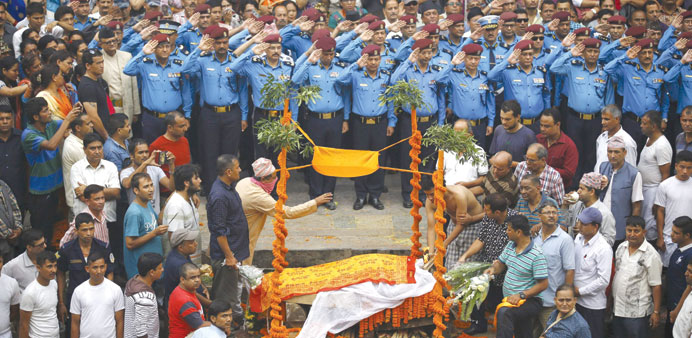Nepali police officers salute as people watch the son of a senior superintendent of police cremate his father, who was killed in Monday’s protest at Tikapur in Kailali district. Police yesterday shot dead a protester as fresh clashes erupted in the country’s southern plains.
AFP
Kathmandu
Nepal police shot dead a protester as fresh clashes erupted in the country’s southern plains yesterday, a day after an 18-month-old boy and seven officers died during demonstrations against a new constitution.
Monday’s violence in Tikapur prompted the government to deploy troops in the town overnight, while the country’s human rights watchdog sent a team to monitor the situation.
In the latest clashes, police fired into a crowd of about 150 demonstrators who were throwing stones at security personnel in the town of Gaur in Rautahat district, 100km (60 miles) south of Kathmandu, a local official said.
“Police were forced to use tear gas and fire (shots), a protester was hit and he died on the way to hospital,” district chief, Madan Bhujel, told AFP.
Further west, hundreds of demonstrators vandalised buildings in Tikapur, defying an indefinite curfew imposed on Monday after protesters attacked police with spears, axes and knives.
“Small clashes have occurred today with a few groups defying the curfew,” said Dhan Bahadur Kathayat, deputy superintendent of Tikapur police.
“They torched a couple of houses, but our teams have put out the fires,” Kathayat told AFP.
Police said they were taken by surprise by the scale of the violence on Monday, when demonstrators turned on security forces, killing seven.
The 18-month-old son of paramilitary officer Netra Bahadur Saud was also killed when protesters opened fire at his home in Tikapur, but police said there were no casualties among the demonstrators.
“My son was playing in front of me, all of a sudden I heard bullet fire,” Saud said.
“Within seconds my son fell to the ground with head injuries... I rushed him to hospital but he was already dead.
“The shooters targeted me... my son was innocent. Why was he killed?” he said.
Anger has been building for weeks in southern Nepal after lawmakers struck a breakthrough deal on a new constitution, spurred by April’s devastating earthquake. The constitution was meant to cement peace after a 10-year insurgency led by former Maoist rebels and draw a line under centuries of inequality.
But plans laid out in the draft charter to divide the country into seven provinces have sparked fury among historically marginalised communities, who say the new borders will limit their political representation.
Monday’s clashes broke out when activists from the Tharu ethnic minority held a protest to demand their own separate province bordering India.
The Tharus have struggled to overcome decades spent as bonded slaves to high-caste landowners.
Puspa Raj KC, spokesman for the Armed Police Force, said the demonstrators outnumbered security personnel and encircled senior officers as the protest turned violent.
“During this time, it was difficult for the commanders to communicate properly with the force and no decision was made to use firearms,” he told AFP.
By the time police fired tear gas to disperse the crowd, more than 40 officers had sustained injuries according to KC, who said there were no casualties among the demonstrators. “Security forces failed to assess the threat... no one expected an attack using such a huge number of home-made weapons,” he said.
Nepal’s National Human Rights Commission called for “an independent investigation of the incident” and warned authorities against retaliating with violence.
“A situation should not arise when citizens’ human rights are violated,” the watchdog said in a statement.
Prior to Tuesday’s killing, police have shot dead three people protesting in other parts of the country against the terms of the constitution in separate incidents over the course of the month.
The UN in a statement urged Kathmandu to reach out to the demonstrators, warning that “there is a clear risk that the protests and violence will continue to feed off each other in the coming days unless all sides change their approach”.
Meanwhile India said Prime Minister Narendra Modi had spoken to his counterpart in Nepal and advised restraint, saying outstanding issues should be resolved through dialogue.

